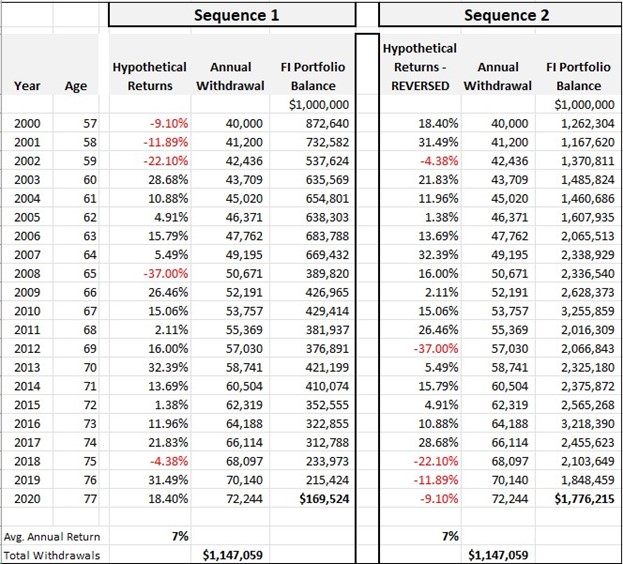In Retirement Planning, Consider the Entire Journey
Retirement planning is like climbing a mountain — how you come down the mountain is just as important, if not more so, than how you get to the top.


Profit and prosper with the best of Kiplinger's advice on investing, taxes, retirement, personal finance and much more. Delivered daily. Enter your email in the box and click Sign Me Up.
You are now subscribed
Your newsletter sign-up was successful
Want to add more newsletters?

Delivered daily
Kiplinger Today
Profit and prosper with the best of Kiplinger's advice on investing, taxes, retirement, personal finance and much more delivered daily. Smart money moves start here.

Sent five days a week
Kiplinger A Step Ahead
Get practical help to make better financial decisions in your everyday life, from spending to savings on top deals.

Delivered daily
Kiplinger Closing Bell
Get today's biggest financial and investing headlines delivered to your inbox every day the U.S. stock market is open.

Sent twice a week
Kiplinger Adviser Intel
Financial pros across the country share best practices and fresh tactics to preserve and grow your wealth.

Delivered weekly
Kiplinger Tax Tips
Trim your federal and state tax bills with practical tax-planning and tax-cutting strategies.

Sent twice a week
Kiplinger Retirement Tips
Your twice-a-week guide to planning and enjoying a financially secure and richly rewarding retirement

Sent bimonthly.
Kiplinger Adviser Angle
Insights for advisers, wealth managers and other financial professionals.

Sent twice a week
Kiplinger Investing Weekly
Your twice-a-week roundup of promising stocks, funds, companies and industries you should consider, ones you should avoid, and why.

Sent weekly for six weeks
Kiplinger Invest for Retirement
Your step-by-step six-part series on how to invest for retirement, from devising a successful strategy to exactly which investments to choose.
Editor’s note: This is part one of a three-part series that takes a look at planning for retirement during the “fragile decade.”
The fragile decade is the wonderfully exhilarating time that spans the last five years of working and the first five years in retirement. It’s also the period that could blow up your whole retirement plan.
If you have not yet reached your fragile decade, pay even closer attention, because this is a glimpse into your financial future — a future that you can be better prepared to take on when it arrives faster than you can imagine.
From just $107.88 $24.99 for Kiplinger Personal Finance
Become a smarter, better informed investor. Subscribe from just $107.88 $24.99, plus get up to 4 Special Issues

Sign up for Kiplinger’s Free Newsletters
Profit and prosper with the best of expert advice on investing, taxes, retirement, personal finance and more - straight to your e-mail.
Profit and prosper with the best of expert advice - straight to your e-mail.
Think about mountain climbing. The journey begins with careful planning for the ascent up the mountain to eventually attain the summit. But mountain climbing isn’t only about standing on the peak, it’s also about getting back down safely. Mountain climbers often say that planning and executing the descent is more involved and difficult than the journey up.
And just like mountain climbing, both stages of our financial plan, the ascent (accumulation) and descent (withdrawal), are best executed when planned out before ever stepping foot on the mountain.
Some investors are obsessively focused on the ascent — accumulating wealth, getting to the peak and triumphantly quitting their job. But recognize this: We must plan for not only getting to the withdrawal stage, but also getting through it. The goal of your investment portfolio isn’t to build the tallest mountain of assets, but to provide you with an acceptable monthly cash flow that you won’t outlive — a comfortable, stress-reduced walk around and down the mountain.
Once you’ve won the game, stop playing
Please notice that nowhere in this goal do we talk about beating the market. As you approach your fragile decade and put your focus on covering your monthly expenses, you should realize that success is best measured by meeting your goals, not beating some arbitrary market benchmark.
But ignoring those around you isn’t always easy. As John Pierpont Morgan once observed, “Nothing so undermines your financial judgment as the sight of your neighbor getting rich.” So, hang tough and continually remind yourself: Don’t try to keep up with the Joneses or beat the market. Take a deep breath and realize the only person you need to beat tomorrow is the person you are today.
“Markets can remain irrational longer than you and I can remain solvent.”
— A. Gary Shilling
One of the most significant reasons that the fragile decade can be so perilous is the effects of sequence risk. This is the danger that the order (i.e. sequence) of market returns will have a material negative impact on your planned withdrawals. Why? Because compound interest works with you during the accumulation stage and against you in the withdrawal stage. Let’s look at a simple example to explain the math.
Assume you retired at age 57 with $1 million at the beginning of 2000. You started with an annual withdrawal of 4% of your portfolio ($40,000), which you increased each year by 3% because of inflation. Sequence 1 in the chart below shows that by 2020, at 77 years young, you would have enough to cover just two more years of withdrawals (and this assumes you had no unexpected expenses over the 20 years).
Sequence 2 has identical assumptions, except that the sequence of the returns is different (I simply reversed the order of the returns). You can see that in both sequences, you achieved the same average annual return (7% simple average) and total withdrawals ($1.1 million). In Sequence 2, however, you would have reached age 77 with almost $1.8 million remaining in your portfolio — $776,000 more than you retired with. The sequence of returns matters!

Note: For those of you who think the hypothetical returns in the above example look far-fetched, Sequence 1 lists the actual annual returns of the S&P 500 Index in chronological order.
The above period, 2000-2020, illustrates the negative compounding impact on withdrawals of down markets especially early on. But to be fair, there are plenty of other periods where the results would not be disastrous and, in fact, could grow the portfolio, or allow you to withdraw more, like Sequence 2. That’s why it’s a risk — you just don’t know what kind of sequence you’re going to be dealt as you enter the withdrawal stage.
Like with the game of chess, see the whole board
While planning for your fragile decade, remember that bull and bear markets are beyond your control — simply the luck of the draw. So, it’s crucial to concentrate on factors that are within your control: the amount of your monthly contributions and withdrawals, setting realistic goals, making informed investment choices and adhering to a dynamic planning process.
In the next article (part two), we will explore goals-based planning — an idea that helps us get beyond simply focusing on how much risk we can stomach. In part three, we pull it all together and offer up some specific ideas for mitigating the impact of sequence of return risk and protecting the retirement cash flow you have diligently worked to achieve.
Part two of this series, arriving next Wednesday, will be about goals-based retirement planning.
As always, invest often and wisely. Thank you for reading.
This content is for informational purposes only. It is not intended to be, nor should it be construed as, legal, tax, investment, financial or other advice.
Related Content
- The Five Stages of Retirement (and How to Skip Three of Them)
- Do You Have the Five Pillars of Retirement Planning in Place?
- Six Financial Actions to Take the Year Before Retirement
- Five Things I Wish I’d Known Before I Retired
- Retirees’ Anti-Bucket List: 10 Experiences You Don’t Want
Profit and prosper with the best of Kiplinger's advice on investing, taxes, retirement, personal finance and much more. Delivered daily. Enter your email in the box and click Sign Me Up.

Cosmo P. DeStefano turned more than 30 years of tax and financial strategy experience into Wealth Your Way: A Simple Path to Financial Freedom, a practical, no-fluff guide to building wealth and achieving financial independence. A retired CPA and former PwC partner, Cosmo has helped individuals and companies navigate complex financial decisions with clarity and confidence. His articles and insights have been featured in Kiplinger, Benzinga, Yahoo Finance, MSN and The Evidence-Based Investor blog, sharing real-world strategies with readers around the globe.
-
 QUIZ: Are You Ready To Retire At 62?
QUIZ: Are You Ready To Retire At 62?Quiz Are you in a good position to retire at 62? Find out with this quick quiz.
-
 Ask the Editor: Questions on Tax Breaks for Caregivers
Ask the Editor: Questions on Tax Breaks for CaregiversAsk the Editor In this week's Ask the Editor Q&A, Joy Taylor answers questions on tax breaks for caregivers
-
 Are You Making These Savings Mistakes?
Are You Making These Savings Mistakes?Avoiding these common mistakes can help you build a foundation of wealth while not leaving thousands of dollars on the table.
-
 I'm a Financial Planner: This Is How You Can Legally Divorce the IRS for the Rest of Your Life
I'm a Financial Planner: This Is How You Can Legally Divorce the IRS for the Rest of Your LifeWith some careful planning focused on the standard deduction, retirees who have large sums in tax-deferred accounts can avoid unpleasant tax bills and even part ways with the IRS for good.
-
 9 Ways the Wealthy Waste Thousands in Taxes: A Checklist for What Not to Miss
9 Ways the Wealthy Waste Thousands in Taxes: A Checklist for What Not to MissThe tax code contains plenty of legitimate ways for the wealthy and business owners to cut taxes. Use this checklist to minimize taxes and stay compliant.
-
 When Estate Plans Don't Include Tax Plans, All Bets Are Off: 2 Financial Advisers Explain Why
When Estate Plans Don't Include Tax Plans, All Bets Are Off: 2 Financial Advisers Explain WhyEstate plans aren't as effective as they can be if tax plans are considered separately. Here's what you stand to gain when the two strategies are aligned.
-
 Counting on Real Estate to Fund Your Retirement? Avoid These 3 Costly Mistakes
Counting on Real Estate to Fund Your Retirement? Avoid These 3 Costly MistakesThe keys to successful real estate planning for retirees: Stop thinking of property income as a reliable paycheck, start planning for tax consequences and structure your assets early to maintain flexibility.
-
 I'm a Financial Planner: These Small Money Habits Stick (and Now Is the Perfect Time to Adopt Them)
I'm a Financial Planner: These Small Money Habits Stick (and Now Is the Perfect Time to Adopt Them)February gets a bad rap for being the month when resolutions fade — in fact, it's the perfect time to reset and focus on small changes that actually pay off.
-
 Social Security Break-Even Math Is Helpful, But Don't Let It Dictate When You'll File
Social Security Break-Even Math Is Helpful, But Don't Let It Dictate When You'll FileYour Social Security break-even age tells you how long you'd need to live for delaying to pay off, but shouldn't be the sole basis for deciding when to claim.
-
 I'm an Opportunity Zone Pro: This Is How to Deliver Roth-Like Tax-Free Growth (Without Contribution Limits)
I'm an Opportunity Zone Pro: This Is How to Deliver Roth-Like Tax-Free Growth (Without Contribution Limits)Investors who combine Roth IRAs, the gold standard of tax-free savings, with qualified opportunity funds could enjoy decades of tax-free growth.
-
 One of the Most Powerful Wealth-Building Moves a Woman Can Make: A Midcareer Pivot
One of the Most Powerful Wealth-Building Moves a Woman Can Make: A Midcareer PivotIf it feels like you can't sustain what you're doing for the next 20 years, it's time for an honest look at what's draining you and what energizes you.